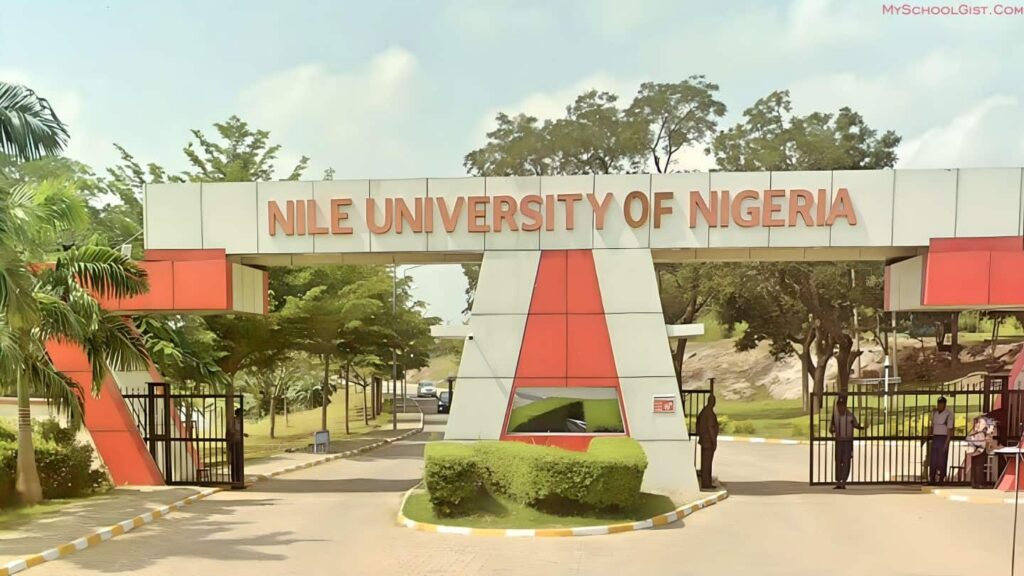Embarking on a journey of academic excellence, Nile University of Nigeria stands as a pillar of learning, offering diverse programs to nurture the minds of students.
Recognizing the importance of accessible education, Nile University has structured its tuition fees to cater to various programs and levels of study.
See Philomath University Courses and Fees

Nile University of Nigeria Overview
Established in 2009 and nestled in the heart of Abuja, Nigeria, Nile University of Nigeria stands as a beacon of multidisciplinary learning.
Accredited by the National Universities Commission and a member of the esteemed Honoris United Universities Network, Nile University is committed to providing quality education across various fields.
A Multifaceted Learning Hub
Nile University offers a diverse range of undergraduate and postgraduate programs, empowering students to explore their passions and potential.
From business to engineering, law to medicine, and the social sciences, the university’s curriculum is designed to nurture well-rounded individuals ready to make a meaningful impact.
For students seeking to enhance their academic qualifications, the School of Preliminary Studies provides a stepping stone to success.
Tailored Tuition: 2023/2024 Academic Session
For the 2023/2024 academic session, Nile University has thoughtfully tailored its tuition fees to accommodate students across different faculties and fields of study.
Here’s a breakdown of the tuition fees for both undergraduate and postgraduate programs:
Undergraduate Programs
- Faculty of Arts and Social Sciences: ₦1,300,000 per semester / ₦2,600,000 per session
- Faculty of Science: ₦1,300,000 per semester / ₦2,600,000 per session
- Faculty of Engineering: ₦1,400,000 per semester / ₦2,800,000 per session
- Faculty of Medicine and Health Sciences: ₦1,600,000 per semester / ₦3,200,000 per session
Postgraduate Programs
- Master of Business Administration (MBA): ₦1,500,000 per semester / ₦3,000,000 per session
- Master of Laws (LLM): ₦1,600,000 per semester / ₦3,200,000 per session
- Master of Science (MSc) in various fields: ₦1,400,000 per semester / ₦2,800,000 per session
- Doctor of Philosophy (PhD) in various fields: ₦1,500,000 per semester / ₦3,000,000 per session
It’s important to note that these figures apply to Nigerian students. International students are subject to higher tuition fees.
Beyond Tuition: Additional Fees and Financial Aid
In addition to tuition fees, students are required to cover additional expenses, including registration fees, examination fees, and hostel fees.
The exact amounts of these fees may vary based on the program and year of study.
Nile University recognizes the financial commitment of students and strives to alleviate this burden through scholarships and financial aid opportunities.
Scholarships are awarded based on academic merit, financial need, or a combination of both. Financial aid can encompass scholarships, grants, loans, or work-study programs.
Exploring Opportunities
For those seeking to explore the dimensions of education, Nile University of Nigeria opens its doors to an environment where knowledge thrives.
With a commitment to academic excellence, the university provides quality education that shapes minds and molds futures.
For more detailed information about tuition fees, financial aid opportunities, and the various programs offered at Nile University, you can visit the university’s official website here.
Nile University invites you to invest in your education, knowing that the value of quality learning resonates far beyond the classroom.
A Campus of Innovation
Nile University’s campus is a modern testament to educational excellence, equipped with state-of-the-art facilities that foster a dynamic learning environment.
The library, computer center, sports complex, and student center are more than just spaces – they’re avenues for growth and discovery.
Scholarships and Beyond
While tuition fees at Nile University may be higher, the institution recognizes the value of making education accessible.
It offers a range of scholarships and financial aid opportunities, allowing students to focus on their studies without undue financial stress.
Unveiling Opportunities
Here are some compelling reasons why Nile University of Nigeria stands out:
- Autonomy and Innovation: Being a private university grants Nile University the flexibility to innovate in its curriculum and cater to the unique needs of its students.
- Global Network: As a member of the Honoris United Universities Network, students benefit from a broader array of resources and opportunities, enriching their educational journey.
- Cutting-Edge Facilities: Nile University’s campus is an embodiment of modernity, providing students with the tools they need to thrive.
- Vibrant Campus Life: A rich campus life is fostered through a multitude of clubs and organizations, ensuring students can find their niche and build lasting connections.
- Academic Prestige: Nile University boasts a strong academic reputation, preparing students for success in their chosen fields.
See Nile University of Nigeria School Fees
Charting Your Academic Journey
Nile University offers a plethora of undergraduate programs, including Accounting, Architecture, Business Administration, Computer Science, Law, Medicine and Surgery, and more.
Postgraduate offerings such as the Master of Business Administration (MBA), Master of Laws (LLM), and Doctor of Philosophy (PhD) in various fields empower individuals to further specialize and contribute to their chosen disciplines.
If you’re considering Nile University as your academic destination, the university’s official website here provides comprehensive information to help guide your decision.
Prepare to embark on a transformative educational journey that equips you for a future of possibilities.

Hello, I’m Emeka by name, an article writer with a passion for words and storytelling. I have a knack for crafting engaging and informative content that captivates readers and delivers valuable insights. Whether it’s exploring the latest trends, sharing knowledge, or diving into creative narratives, I’m here to bring words to life. Join me on a journey through the world of ideas and stories as we explore the power of written expression.





